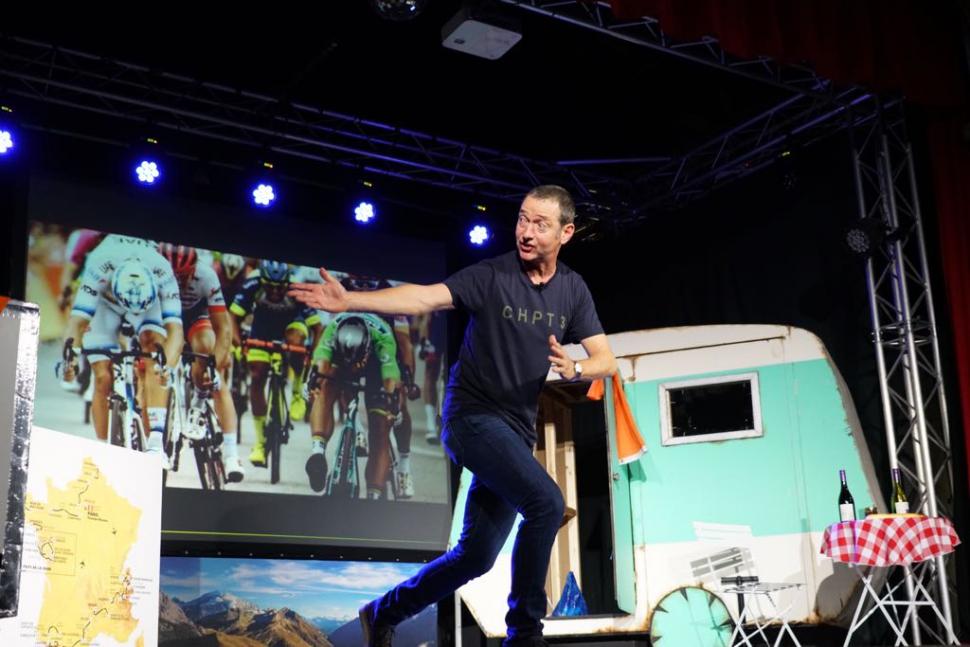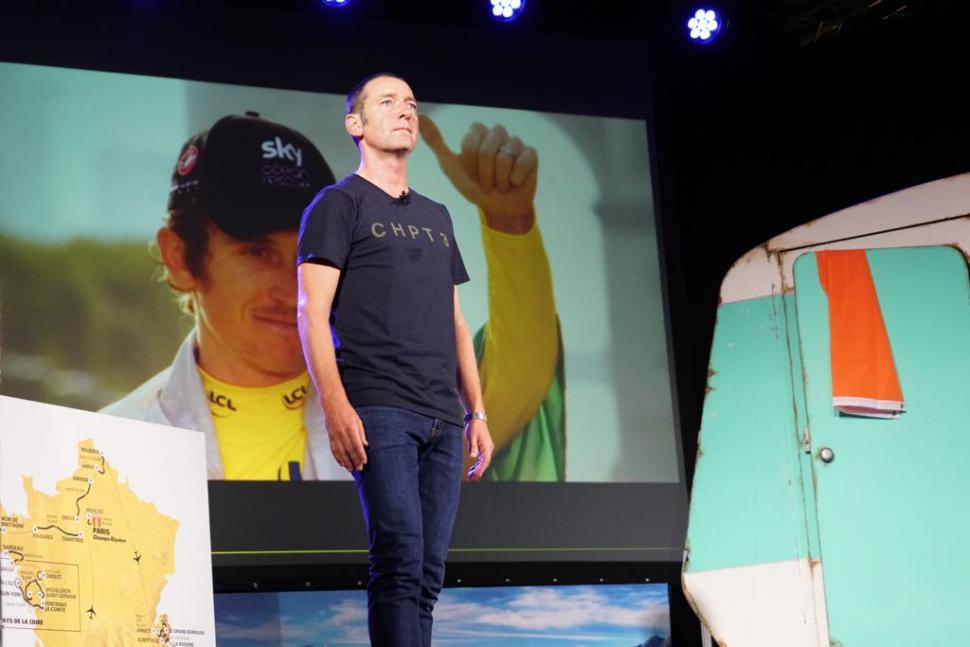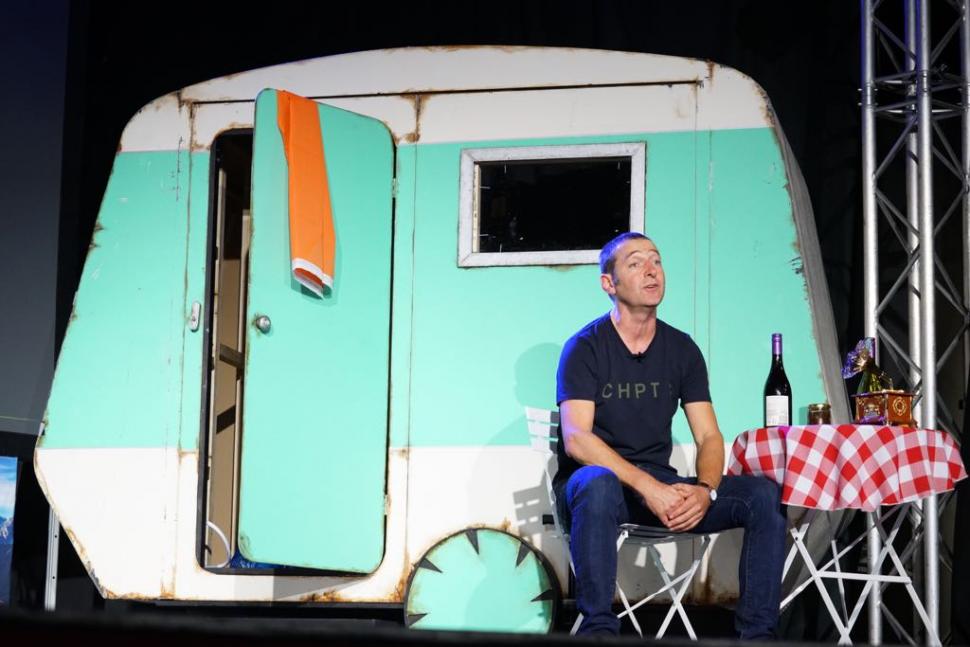- News
- Reviews
- Bikes
- Accessories
- Accessories - misc
- Computer mounts
- Bags
- Bar ends
- Bike bags & cases
- Bottle cages
- Bottles
- Cameras
- Car racks
- Child seats
- Computers
- Glasses
- GPS units
- Helmets
- Lights - front
- Lights - rear
- Lights - sets
- Locks
- Mirrors
- Mudguards
- Racks
- Pumps & CO2 inflators
- Puncture kits
- Reflectives
- Smart watches
- Stands and racks
- Trailers
- Clothing
- Components
- Bar tape & grips
- Bottom brackets
- Brake & gear cables
- Brake & STI levers
- Brake pads & spares
- Brakes
- Cassettes & freewheels
- Chains
- Chainsets & chainrings
- Derailleurs - front
- Derailleurs - rear
- Forks
- Gear levers & shifters
- Groupsets
- Handlebars & extensions
- Headsets
- Hubs
- Inner tubes
- Pedals
- Quick releases & skewers
- Saddles
- Seatposts
- Stems
- Wheels
- Tyres
- Health, fitness and nutrition
- Tools and workshop
- Miscellaneous
- Cross country mountain bikes
- Tubeless valves
- Buyers Guides
- Features
- Forum
- Recommends
- Podcast
news
 Tour de Ned (picture courtesy Holbeck Ghyll)
Tour de Ned (picture courtesy Holbeck Ghyll)Tour de Ned: We preview Ned Boulting's latest show - and interview the man himself
Ned Boulting – ITV4 reporter and, more recently, commentator on the Tour de France – is about to embark on a nationwide jaunt of his own as he takes his Tour de Ned on a 21-date trip around the UK. We caught up with him last week as he previewed the show in the Stanley Halls in south London.
Getting underway in Southampton on 28 September, the Tour de Ned concludes in Lincoln on 17 November, allowing for more rest days – and more time for those long transfers – than the race Boulting chases round France each July does.
The version of the show we saw may have been a rough cut with some work to be done before the tour proper, a bit of a Criterium du Dauphiné translated to the theatre, perhaps?
But it was a belter, and much in the same way that comedians will perform one-off shows to preview the act they plan to take to the Edinburgh Fringe ahead of August each year, one of the aims was to see what works in front of an audience, and what doesn’t.
It turns out that Boulting is a natural stand-up, If you’ve read his 2011 book, How I Won The Yellow Jumper, you’ll know that he isn’t afraid to have a joke at his own expense.
He certainly isn’t adverse to taking the piss out of his ITV4 colleagues either, including Gary Imlach, Matt Rendell, Chris Boardman and David Millar – although the fact that the latter was sitting in the front row at the preview did send Boulting scurrying for cover after a joke at Millar’s expense that brought perhaps the biggest laugh of the night from the audience.
The Tour de Ned is billed as following this year’s Tour de France, but it is so much more than that, with Boulting invoking memories – and ghosts – of Tours past. If it’s on near you, we’d thoroughly recommend catching it.
As well as getting a sneak preview of the show, we also got a chance to ask Boulting about his career as a broadcaster and his views on cycling.
TV vs theatre
There’s clearly a difference between working on TV, where an audience that at times may number in the millions can’t be seen, and being in a theatre where a much smaller audience can. Having already toured with one show, how did that transition make him feel?
“Terribly nervous,” Boulting reveals. “That feeling of fear has never totally left me. If truth be told, live telly never makes me nervous – just tense – whereas stepping onto stage has me in bits.
“The flip side of that is the reward when the show is running well, and the audience are with you. Some nights can be really special.”
Picture courtesy Holbeck Ghyll
Why cycling?
As you may know, Boulting first appeared on TV on Sky’s Soccer Saturday before moving to ITV, where he was involved in coverage of the Champions League and FIFA World Cup, among other things.
Given that working on flagship football tournaments might be seen as the biggest aim of many aspiring sports broadcasters, what made him decide to focus on cycling?
“I think, initially, it was because of cycling’s secret code,” he told us. “I found that its complexity, rather than putting me off, drew me in. I loved the fact that English was a minority language in the peloton (it isn’t any more). The whole thing felt like an adventure.”
It’s a reaction shared by many who discover the sport later in life – including the writer, who would hazard a reasonably safe bet that most people reading this didn’t grow up in a house that ground to a halt each July when the Tour de France was on TV, and came to the sport later on.
And if you are one of those people, you’ll know there is a steep learning curve in getting to up to speed with issues such as the tactics, the rules, the roles of various riders in a team, the different types of stages, not to mention – as Boulting acknowledges in the title of his book – the ‘jumpers’.
So just how hard did he find it to get to grips with the sport?
“I still find it hard to understand,” he confessed. “Things happen in a race that are sometimes impossible to explain in any rational sense. Especially when Thomas de Gendt is attacking.”
This was before the final week of the Vuelta when the Belgian went full Thomas de Gendt to win the mountains jersey, by the way.
“I cannot think of any other sport with as much nuance,” he added. “Understanding the peloton is like trying to understand the movement of Atlantic weather systems crossing an ocean.”
Given the winds that have buffeted southern England today, the ones that didn’t get that much of a mention on the forecasts over the weekend, we have to agree.
What's changed since 2003?
Since Boulting first started covering the Tour in 2003 – the year Lance Armstrong took the fifth of the seven victories that would be taken away from him as he was banned from the sport for life – professional cycling has evolved beyond all recognition. What stands out for him?
“Sky are the biggest single change,” he said. “Their dominance, unimaginable a decade ago, has forced everyone to react.
“Arguably, they are a problem for the sport, of the Tour at least, because they seem impregnable, both in a sporting context and courtesy of their financial might.
“But,” he continued, “one should never underestimate the vast impact they have made on the popularity of the sport on these shores.”
"The rest of the world is completely sick of British domination”
We were speaking at the start of a week that would end with Simon Yates winning the Vuelta and thereby completing a unique treble as Great Britain became the first country ever to win all three Grand Tours with three separate riders in the same year.
Six of the past seven editions of the Tour de France have now been won by British riders – and the last five Grand Tours – something unimaginable a decade ago. But how do his colleagues on the Tour de France from other countries view that?
“I’d be lying if I didn’t say that the rest of the world is completely sick of British domination,” Boulting reflected.
“That is a remarkable thing to say, when you think about it. But outside of the British bubble, people yearn for a change of the script.
“A French winner would be good for example, and we seem to move further away from that prospect with each passing year,” he added.
Moving into commentating
Initially, Boulting was the ITV reporter who would grab interviews with riders at the start and finish of stages, as well as fronting features that figured within its coverage such as the memorable segments where, on a bike, he played domestique to Chris Boardman explaining the nuts and bolts of the sport.
Now, of course, he is in the commentary booth, calling the race. How hard was that transition, and how does he prepare for a race where any one of 180-odd riders could attack or crash at any time?
“Commentating on the Tour requires a level of preparation that dwarfs everything else,” Boulting said. "The research starts in January. I watch, and absorb as much racing as I can, all year long. Whole weeks can go missing.”
It’s hardly a secret that those of us working in the cycling media find Procyclingstats.com, among other sites, an invaluable resource in covering the Tour de France and other races.
“But,” Boulting said, “nothing replaces face to face contact with riders, to ask them directly about the kind of things that are not documented on any database.”
Live commentary of course brings its pitfalls, as Private Eye’s Colemanballs feature amply demonstrates. So does Boulting have any embarrassing moments that spring to mind? Of course he does.
“There was a truly awkward moment on this year’s Tour when Peter Sagan stopped in the convoy while a mechanic adjusted the straps on his helmet,” he explained.
“Sagan took the opportunity to have a wee, which prompted Chris Boardman to say, ‘Sagan, having some trouble with his helmet.’ I had to cut the mics. A good minute elapsed before I had composed myself enough to speak again.”
The odd gaffe aside, working on the race has also provided some moments that stick with Boulting well after the racing has finished.
“I think the most memorable stages I have commentated on tend to involve Julian Alaphillipe,” he said. “His attacks into Luchon, and Le Grand Bornand this year were thrilling. He’s the most exciting racer to watch in the current crop.”
Working with David Millar and Chris Boardman
David Millar now sits alongside Boulting in the commentary booth at the Tour de France, and is a much more recent retiree from the sport than some other pundits, and therefore perhaps more insightful about how the race is ridden nowadays as tactics have involved.
We asked Boulting how much working alongside Millar – whom he has admitted was a go-to rider for quotes back in his reporting days – had increased his understanding of the race.
“Immeasurably,” he replied. “I owe my entire understanding of bike racing to David, warts and all.
“He was there as a racer in 2003, the first time I ever watched the Tour de France. And he’s still there with me now. It’s kind of mind-blowing.”
Some of Millar’s greatest successes – at the Tour de France, the Commonwealth Games, and in the World Championship he was subsequently stripped of as a result of his doping ban – came in the time trial.
Boulting himself rode a time trial a few years back on the closing stage of the Tour of Britain in London, with celebrities invited to have a go on the course ahead of the professionals tackling it.
How did it feel to be the other side of the barriers with the crowds cheering him on?
“It was an unforgettable experience,” he said. “Of course, I let the excitement get to me, as I knew I would. I went far too hard, far too quickly. Within a minute I had exploded.”
Millar is a more recent addition to the ITV commentary team, but one of his predecessors in the yellow jersey of Tour de France leader, Chris Boardman, has been one of the mainstays of the coverage since Boulting began working on the race .
The former world and Olympic champion – and father of six, as he mentions on his Twitter bio and Boulting alludes to once or twice in his book – has now covered the race for the final time for ITV4. How did Boulting find it working with him over the best part of two decades?
“It’s been a real pleasure and an honour to get to know Chris,” he said. “It took a long time. He’s naturally wary. But once he decides that he trusts you, he’s very loyal, and great fun. I will miss him.”
Cycling, away from the sport
Boardman is now focusing on his role as Greater Manchester Cycling & Walking Commissioner and has been a tireless and eloquent campaigner for everyday cycling.
As someone who himself used a bike to get around town, we asked Boulting what he thinks the most important thing is that could be done to make conditions safer for those of us on two wheels?
“It has to be segregation,” he replied. “The mix is not working, and everywhere they have been built (I can only talk for London) they are heavily, and increasingly used.
“The experience of using them is a game-changer. Unconsciously, you relax, when you are no longer shoulder to shoulder with buses and taxis.
“But beyond that, I think, we need to de-Lycrafy and normalise the experience.
“Winning the helmet compulsion debate, and returning utilitarian cycling to realm of normal clothing worn by normal people doing a normal thing would be a start.”
Après-Tour relaxation
Back to the race itself that is the raison d’être behind the Tour de Ned. By our reckoning, Boulting has covered 18 editions of the race that is the world’s largest annual sporting event. So when he emerges each year from the bubble around the Tour de France, how does he decompress?
The answer may surprise you, given that he has just spent four weeks or so in the country, covering thousands of miles.
“I tend to hang around in France, to experience the country without the madness and clamour of the race to contend with,” he told us. “I switch the phone off, and read a book.”
If you go watch the show, you’ll find out which book that was this year – and from what he said, we’re quite keen to track down a copy ourselves.
Back to the bubble next year
In the meantime, the Tour de France will be back next year, and at some point during the Tour de Ned – hopefully, when he’s having some of those rest days – next year’s route will be presented in Paris.
While riders and team management in the auditorium scrutinise the parcours for stages they may target, or ones that may prove decisive for the overall, what does a broadcaster such as Boulting look for?
“The first thing I look at is the final transfer to Paris, which, over the last two years have been truly obscene,” he replied.
“After that I look to see if the race is passing through my favourite parts of the country, which include Brittany, the Massif Central and the Vosges mountains. The Alps, I dread. But I like the Pyrenees. They’re more real, somehow. Less phony.”
Phony is a word that could be used to describe much of the Tour de France during Boulting’s time covering the race, and by pure coincidence is a near homophone of Phonak.
The Tour de Ned demonstrates his particular knack, though, of turning it into something funny.
Check the dates of the Tour de Ned and book tickets here.
Picture courtesy Holbeck Ghyll
Simon joined road.cc as news editor in 2009 and is now the site’s community editor, acting as a link between the team producing the content and our readers. A law and languages graduate, published translator and former retail analyst, he has reported on issues as diverse as cycling-related court cases, anti-doping investigations, the latest developments in the bike industry and the sport’s biggest races. Now back in London full-time after 15 years living in Oxford and Cambridge, he loves cycling along the Thames but misses having his former riding buddy, Elodie the miniature schnauzer, in the basket in front of him.


Indicative of how poor our legislators are at responding in a timely manner to safety concerns....
Shurely you stop at "you'd be liable". I haven't checked the details yet but surely cameras and witnesses only come in if there is a dispute? If...
Shimano Tourney rear mech has an oversized lower pulley and it's red!...
Extraordinary claims require extraordinary evidence. ... do share.
"And we're having a pint at the Dog & Trumpet!"
NOTHING can destroy a Cyber Truck*….😎😏 #WorldBollardAssociation *swasticar
How can these be better than water shoes in the wet? The clue is in the name. Water shoes will handle the wet better, have a thicker sole and dry...
Can't recommend - my shirts have now discoloured and I seem to attract the wrong sort of DIY mechanic.
Spare a thought for Phil from Fowey whose cut-through is closed; if only there was an alternative. He's even done a video. ...
Even in NL (with excellent wide cycle infra, some of which actually started as motor scooter paths) they're having second thoughts about "motor...